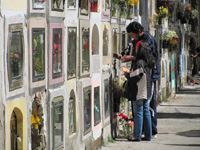On November first, all countries that follow the Catholic tradition celebrate this day in honor of all saints, including those that are not yet canonized.
 In Latin America, this festival takes on a kind of syncretism resulting from the merger of Christian practices with the customs of pre-Spanish cultures, which have a concept of death that is totally different from Western ideas. In the Aymara culture, an Andean society, for example, "natural death is not a tragic event but more a cycle of life itself. Therefore, when someone dies, it is said that person 'has gone' or 'has left.'Among the traditions that are still alive, it is believed that the ajayus (the souls) come to bring fruitfulness and fertility for the entire year because the sowing season begins in November on Altiplano farms."
In Latin America, this festival takes on a kind of syncretism resulting from the merger of Christian practices with the customs of pre-Spanish cultures, which have a concept of death that is totally different from Western ideas. In the Aymara culture, an Andean society, for example, "natural death is not a tragic event but more a cycle of life itself. Therefore, when someone dies, it is said that person 'has gone' or 'has left.'Among the traditions that are still alive, it is believed that the ajayus (the souls) come to bring fruitfulness and fertility for the entire year because the sowing season begins in November on Altiplano farms."
 In Bolivia, the ceremony begins at noon on the 1st of November and goes through noon on the 2nd (a holiday) since it is believed that "on November 1st at noon the ajayus return from their mountains to dwell for 24 hours with their families and friends." This ritual includes donation of offerings to the souls by "an altar or table called apxata that is decorated with flowers, candles, reeds, fruits, drinks and sweets among other items."
In Bolivia, the ceremony begins at noon on the 1st of November and goes through noon on the 2nd (a holiday) since it is believed that "on November 1st at noon the ajayus return from their mountains to dwell for 24 hours with their families and friends." This ritual includes donation of offerings to the souls by "an altar or table called apxata that is decorated with flowers, candles, reeds, fruits, drinks and sweets among other items."
One of the elements at the altar is the "tantawawa," a cake about 50 cm long "in the shape of a person with a red face that is modeled in stucco to represent the deceased." The bread stairway is another component of the apxata which symbolizes the ascent of the soul to heaven.
A very common activity during these days is the traditional visit to the cemetery where people make appointments to receive the souls of their dearly departed with offerings, prayers and music.

If the deceased passed away during that same year, a table or altar is prepared. A very popular custom is to "make prayer", which means to hire someone (yatiri, musician or a professional to pray) to say a prayer or dedicate a song to the deceased.
A lot of business is done around the cemetery with people offering services (cleaning the mausoleums, praying, playing, singing, etc.) and vendors (flowers, tantawawas, etc.).
The idea of death in pre-Spanish cultures is of an event that brings about a change that should not be thought of as the end of a cycle but as a continuation of this cycle. It has a harmonious (cyclical) relationship with life since it is the origin and the result of life.
Sources:
https://www.cambio.bo/noticia.php?fecha=2010-10-31&idn=31393
https://www.katari.org/la-concepcion-aymara-de-la-muerte/


